- Home
- Andy Andrews
The Noticer Returns
The Noticer Returns Read online
PRAISE FOR THE NOTICER RETURNS
“The Noticer Returns is a magical story that will change how you look at life.”
— Winston Groom, New York
Times best-selling author of
Forrest Gump
“I read everything he writes again and again. Andy Andrews is, quite simply, my favorite author.”
— Margaret Kelly, CEO, RE/MAX
“The amazing principles Andy Andrews reveals in his books are a large part of the success we have been able to achieve as a hospital system. In The Noticer Returns be sure to pay particular attention to his ‘Secret Philosophy of Extreme Achievement.’ That one nugget of wisdom continues to produce outstanding results for our employees—personally and professionally—every single day.”
— John Heer, president/CEO, North
Mississippi Health Services;
and the world’s only three-time
Baldrige Award recipient
“Parenting . . . creating a profitable business from scratch . . . even a mind-blowing perspective on dealing with Alzheimer’s and death . . . The Noticer Returns is a book you and I will purchase by the case. Let’s give this book to as many people as we can and begin changing the world right now!”
— Tim Hudson, Atlanta Braves
pitcher
“Andy Andrews is America’s greatest storyteller since Mark Twain and perhaps our most interesting teacher since Robin Williams played John Keating in the movie Dead Poets Society. The Noticer Returns is another in his long line of winners.”
— Robert Mayes, president, Columbia
Southern University
“If Andy Andrews lived in England, the queen would have knighted him by now. Andy’s books—all of his books-—are just that good!”
— Louie Anderson, comedian and
actor
“The Noticer Returns is better than great and has the power to cement the direction of your family for generations. Andy Andrews has become the wise master of storytelling.”
— Paul Westphal, former Lakers
All-Star and NBA head coach
“With The Noticer Returns it has become clear that Andy Andrews owns this genre. Once again he has created a satisfying blend of life-changing principles with a fantastic storyline. Andy has singlehandedly turned the ‘inspirational novel’ into an art form.”
— Brenda Warner, best-selling author
and speaker
“Parents, coaches, employers, and employees . . . drop what you’re doing and read this book today! Andy Andrews reveals uncommon wisdom in a common sense kind of way. The Noticer Returns is a guide-book to the life you’ve always wanted for your family.”
— Kurt Warner, Super Bowl
champion quarterback and NFL
broadcaster
“Andy Andrews is my favorite author . . . my very favorite.”
— Robert Morris, founding senior
pastor, Gateway Church
“If C. S. Lewis were alive today, his favorite author would be Andy Andrews.”
— Sandi Patty, vocal artist, winner of
more than 25 Grammy and Dove
awards
The
NOTICER
RETURNS
© 2013 Andy Andrews
All rights reserved. No portion of this book may be reproduced, stored in a retrieval system, or transmitted in any form or by any means—electronic, mechanical, photocopy, recording, scanning, or other—except for brief quotations in critical reviews or articles, without the prior written permission of the publisher.
Published in Nashville, Tennessee, by W Publishing Group. W Publishing is a registered trademark of Thomas Nelson, Inc.
Thomas Nelson, Inc., titles may be purchased in bulk for educational, business, fund-raising, or sales promotional use. For information, please e-mail [email protected].
Library of Congress Cataloging-in-Publication Data
Andrews, Andy, 1959–
The noticer returns : sometimes you find perspective, and sometimes perspective finds you / Andy Andrews.
pages cm
Includes bibliographical references and index.
ISBN 978-0-7852-3145-5 (hardcover : alk. paper) 1. Conduct of life. 2. Perspective (Philosophy) 3. Insight. I. Title.
BJ1597.A527 2013
170'.44—dc23 2013013479
Printed in the United States of America
13 14 15 16 17 RRD 6 5 4 3 2 1
To Dr. Wil Baker,
a college friend of my parents,
who now, decades later, has become a wise and trusted friend to me.
Dr. Baker is an important mentor to Polly as well and is a huge influence in the life of our family.
Contents
Prologue
One
Two
Three
Four
Five
Six
Seven
Eight
Nine
Ten
Eleven
Twelve
Thirteen
Fourteen
Fifteen
Sixteen
Seventeen
Eighteen
Nineteen
Epilogue
Acknowledgments
Prologue
My name is Andy Andrews. I am a daddy and a husband. I am a friend to some—a good and loyal one, I like to think—and a member of a small community on the Gulf Coast that boasts a population of around four thousand when the tourists aren’t using the beach.
I am also a writer and a speaker. As one who communicates as a profession, it is strangely uncomfortable to involve myself or incorporate details of my own life in a book or a presentation, but I understand that it is sometimes necessary. Occasionally, as much as I wish it were not so, the truth in full context simply cannot be achieved until all the facts—including the intricacies of how those facts might be perceived now and in the future—are on the table.
As we begin this story, please allow me to admit I have found no other way around that reality. Therefore, as reluctant as I may be to cast myself as a character in this particular story, I have come to this conclusion: without knowing a few specifics about my own fears and struggles, it would be difficult, if not impossible, to fully understand Jones or the inestimable value his life and words hold for you right now . . . today.
At this very moment, if you have ever read one of my books or listened to my audio recordings or seen me on stage, you probably feel as though you know me much better than you know the old man about whom this story will be told. Of course, my own human nature prompts me (even now) to simply shut up and allow you to continue thinking whatever nice things you might have decided about the written and spoken words for which I get credit.
Through the years and many hard lessons, I have found that no matter how long it takes or how desperately a person battles or denies, the truth always—always—makes itself known. In addition, even those casual statements we commonly call half-truths, white lies, or exaggerations are costly and embarrassing when they come to light.
Therefore, for the record, allow me to begin with this particular truth: whatever good things you think of me, I believe a certain man named Jones to be responsible. He is also responsible for the daddy and husband I am still in the process of becoming. He deserves the credit. His is the life and wisdom and truth you should carefully examine with any time or connection that you possess. And now I am honored to be one of those connections . . .
As I mentioned earlier, I am a writer. I am not the best writer around here or even the only writer in town. I’m just one of several. When I am away from Orange Beach and people ask what I do for a living, I usually hesitate to use the word author. For some re
ason I have always thought the phrase “I am an author!” sounds like someone who considers himself a big deal. I don’t. And I am not. If you wanted me to prove it, you could ask what kind of books I write. Any person who has written a book should be able to answer that, right? Honestly, I’m not even sure myself.
I am not attempting to sound humble or pull some “aw, shucks” routine in order to lure you into disagreeing with me about myself. Putting a label on the kind of books I write is like lassoing a bumblebee, and I know it. A mental run-through of traditional publishing labels will tell you very quickly that the task will not be easy. Trust me on this: the best minds in the book business have already tried.
The first book I wrote that was read by anyone other than my family and friends was called The Traveler’s Gift. It was easy to read and interesting—at least that’s what folks said. I thought of it as a story that includes some of life’s principles. It eventually made the New York Times Best Sellers List in the Fiction category, but that same week the book made the Wall Street Journal Best-Selling Books list in Nonfiction. Barnes & Noble placed it in their Self-Improvement section. Amazon.com determined it to be Literature, and there it stayed until they finally settled on the two different categories it still occupies today: Inspiration and Spirituality.
Even the stalwart publication Publisher’s Weekly struggled to define it. Widely read and greatly respected, Publisher’s Weekly is an international magazine that has been produced four times a month since 1872, and for the first time in a history of more than one hundred years, Publisher’s Weekly listed and reviewed a single book—The Traveler’s Gift—in different sections within a week of each other, in October 2002. Religion loved The Traveler’s Gift and gushed, “Andrews is an author to watch.” The review even compared the book favorably to the Christmas classic It’s a Wonderful Life. On the other hand, the Fiction section greatly disliked the book and gave it a negative review.
Meanwhile, the New York Times kept The Traveler’s Gift on its bestseller list but decided the book was not fiction after all. They placed it in the Business category. To this day, I walk into most bookstores and still need to ask for help finding the Andy Andrews titles. Believe it or not, I was once escorted to my own books . . . in the Travel section.
So how does one define my writing? I honestly have no idea, and it has caused many a dinner conversation to end in stories and laughter. Perhaps that is why I struggle at times to figure out what it is that I am supposed to put on paper. And there begins our story . . .
One
I found him.
I wasn’t looking for him, but there he was, real as life. It was only a glimpse at first, but he stopped and turned, almost as if he felt my gaze upon him. The instant we locked eyes, he grinned. And it was like the old man had never left.
But he did leave. He had disappeared several years ago without so much as a good-bye, and like the old man himself, the circumstances of his departure had been odd. Leaving our tiny, coastal community without being seen by a single person was strange enough—small-town folks don’t miss much—but tucking a cryptic message inside a beaten-up suitcase and abandoning it in the middle of a parking lot . . . well, the whole thing had been perplexing. It had also been the number-one topic of conversation in our town for weeks.
In time, however, the residents of Orange Beach came to believe he was gone for good, and a mourning of sorts had settled over the whole community. It wasn’t a tragedy. We had suffered through hurricanes and oil spills—we knew what tragedy felt like. It was more of an emptiness we couldn’t quite define.
So in lieu of anything specific, we talked endlessly about what we did remember. We discussed his clothes and wondered why we had never seen him in anything other than jeans and a T-shirt. Besides the leather sandals on his feet, that particular ensemble typified his entire wardrobe. We had seen him at a wedding on the lagoon, in restaurants, and even in church a time or two, but never dressed in anything other than jeans and a T-shirt.
No one had ever known where he lived or even where he slept at night. To our knowledge, he had never so much as spent a rainy evening at anyone’s house. He didn’t own property in our county—we all have friends working at the courthouse, and they checked.
Neither, we all agreed, could he possibly have had a tent in the small brown suitcase that never left his side. And about that suitcase . . . until the day of his disappearance, none of us had ever seen him without it. It was an early weekday morning when Ted Romano, the owner of Pack & Mail, found the old, scuffed-up piece of luggage sitting by itself in the middle of an almost empty parking lot.
Yes, we all had stories about watching the old man struggle through a door with it or carry it with him as he filled a plate from a local salad bar, but as far as we could tell, no one but the man himself had so much as touched that suitcase until the day he vanished.
There was also the age thing. We were almost obsessed with the subject of how old the man might be. We had conceded long before that it was impossible to know his age for sure. His appearance yielded no real clues. “Old” was as close as we could guess. His hair was longish—not long enough for a ponytail, but longish—and as white as polished ivory. Usually only finger-combed, his hair was casually worn and almost beautiful. But his hair was only the first thing about him anyone noticed.
It was the old man’s eyes that stopped people in their tracks. Sparkling as the laughter of a child and imbued with a color I can describe only as tranquil blue, his eyes verged on luminescence. Set against the brown skin of his face and framed by that snowy hair, his eyes would hold a person as long as he cared to talk. And he could really talk . . .
None of us had ever had the opportunity to listen—truly listen—to anyone like him before. It wasn’t that he talked a lot. He didn’t. It’s just that when he did talk, the words that tumbled from his mouth were so precise and significant that folks drank in every one.
You may think I am exaggerating, but there are more than a few of us in Orange Beach who credit this old man with changing our lives. In fact, I might be at the top of that long list. But then, my relationship with Jones has spanned more years than anyone else’s.
He found me at a particularly tough time in my life when I was twenty-three years old. For several months he was a friend when I didn’t have one and told me the truth at a time when I didn’t want to hear it. Then he disappeared for close to thirty years.
The next time I saw him was a few years ago when he arrived, as he had the first time, seemingly out of the blue. One awfully curious thing I became aware of during that time was that the old man had apparently been in and out of our town for years. Maybe for decades.
Remember how I said we didn’t know how old he was? Well, I talked to some people who were pretty old themselves, and they said the old man had been around when they were kids. And they swore up and down that he had been an old man then. Of course, that doesn’t make sense to me even now. When I first heard it—and I heard it a lot—I ignored all the talk. Still, I had to admit that he didn’t look much different from the first time I had seen him.
His age wasn’t the only strange thing about the old man. His skin color was another. He was deeply tanned. Or dark brown. No one could agree on whether his pigmentation had been determined by genetics or a lifelong aversion to sunscreen. As for me, I simply didn’t care.
It was curious, however, that African Americans seemed to take it for granted that the old man was black, and Caucasians assumed he was white. I saw it happen so often that I thought it was funny. I even asked him about it once. His answer didn’t have much to do with the question, though, and I was not surprised.
I loved the old man, and I was not the only one. And I already told you how much of a difference he made for many of us. But I would be remiss if I did not submit this for consideration as well: there were people in our town who thought the old man was crazy.
It was all very strange . . . how he was mocked and ridiculed by some and the
way he just grinned and took it. Some folks—right to his face—even called him names.
Me? I just called him Jones. Not Mr. Jones. Just Jones.
Two
Gulf Shores, Alabama
November, thirty-two years ago
It was a cold night on the Gulf Coast, and I was wearing everything I owned, including an insulated denim jacket I had found in someone’s trash. It was almost midnight, and I was coming from a marathon session of cleaning fish for Jeannie’s Seafood at the intersection of Highway 59 and the beach road. I was headed back to the Gulf State Park Pier, exhausted and cold, eager to climb under its shelter and sleep.
As was my habit, I got off the main road and walked behind the homes and businesses on the beach. I did this in order to avoid attention from anyone who might wonder what a kid was doing walking the streets of a small beach town alone at night. I was trudging through the concrete pilings under the Pink Pony Pub when Jones joined me.
It was not a surprise, really. I was becoming accustomed to the uncommon way he would commonly appear. This night he simply matched my stride and walked with me. As usual, the old man was in jeans and a T-shirt. “How do you keep from freezing?” I asked.
“I think warm thoughts,” Jones replied, before noting, “Woowee! You smell like fish.”
Continuing to trudge through the sand with my head down and my hands in my pockets, I said, “Yeah, well, spend a day up to your elbows in twenty-six hundred pounds of ’em, and we’ll see what you smell like.”
Jones was quiet for a while. I suspected he had sensed my mood and was being careful. My current station in life had taken an emotional toll that was not beyond repair. The circumstances were evident, however, even to those who knew me in passing. Jones was aware that I was a threat to fly into a rage or burst into tears or rip someone to pieces with my words. One or more of these crazy manifestations of how I felt at the moment happened far too frequently, and sometimes they happened in public. I didn’t want to behave or conduct myself in that manner, but I believed it was nothing I could control. What can I do? I often thought. This is me. This is how I feel. This is just the way I am . . .

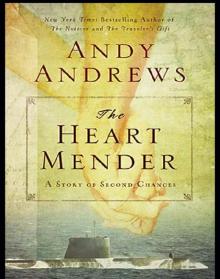 The Heart Mender: A Story of Second Chances
The Heart Mender: A Story of Second Chances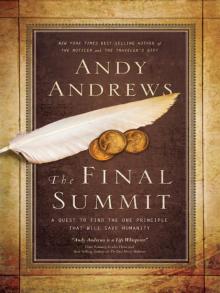 The Final Summit: A Quest to Find the One Principle That Will Save Humanity
The Final Summit: A Quest to Find the One Principle That Will Save Humanity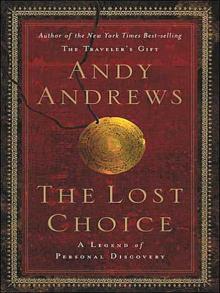 The Lost Choice
The Lost Choice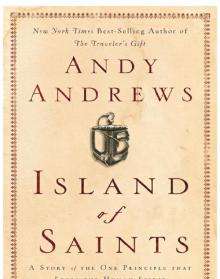 Island of Saints: A Story of the One Principle That Frees the Human Spirit
Island of Saints: A Story of the One Principle That Frees the Human Spirit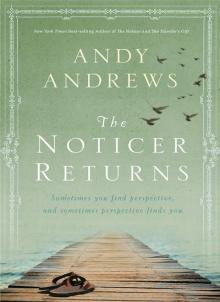 The Noticer Returns
The Noticer Returns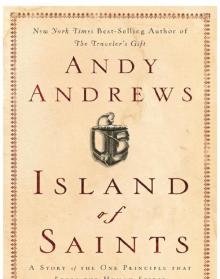 Island of Saints
Island of Saints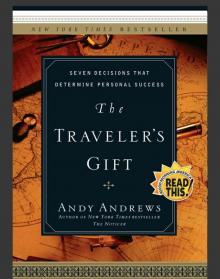 The Traveler's Gift
The Traveler's Gift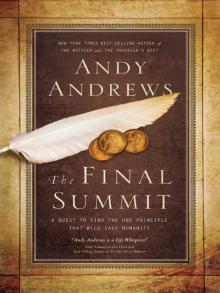 The Final Summit
The Final Summit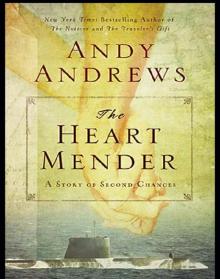 The Heart Mender
The Heart Mender